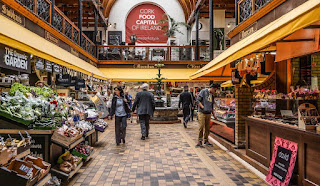Market activities can be divided into 4 categories which are consumption, production, distribution and exchange. Consumption is the process of satisfying one’s needs and wants and consumers will consume goods and services that can give maximum utilities to them. Production is an activity where goods and services are produce by using scarce resources. There are four types of scarce resources in the production process which are land or natural resources, capital, labor and entrepreneurship. Distribution explains how income or wealth is distributed among individuals or factors of production. Lastly, exchange is an economic behavior that shows how one scarce resource is exchange for another.
In Capitalism, the concept of free market or laissez-faire is applied where resources are owned by private individuals and businesses. It means that private individuals and businesses are completely free to decide what to produce and sell and at which price level to exchange goods and services. Consumers under capitalist economic system will consume goods and services that will maximize their utility while firms will consume resources that can give them maximum profit. The production of goods and services in capitalism aim at lower cost and maximize profit. Therefore, firms will choose the best and inexpensive way of production in order to have higher profits and avoid losses. For example, way of production can be either by using machines or labor capital, whichever will give lower cost to the firms. Goods and services under capitalism is distributed based on consumer willingness and abilities to consume and pay. Therefore, under capitalist economic system the society’s welfare are being ignored because of no presence of government role. Lastly, the price level of goods and services in the economy is determined by the level of demand and supply in the economy where it will let the market to automatically adjust to the change of the price level.
On the other hand, Islamic economic system has a different approach to these activities compared to Capitalism economic system. In Islamic economic system, the role of both private individuals and government are important to sustain the economy. Resources under Islamic economic system is considered as amanah or trust whereby Allah is the real owner of all the resources. Man is regarded as trustee to acquire the resources available and consume it towards pleasing Allah. Consumers are given the freedom to consume goods and services that gives them maximum utility as long as it is permissible by Islam. The production under Islamic capitalism is also aim to earn profit as Islam does not prohibit man to earn profit. However, it must be free from any exploitation or monopoly that may affect other people or society as a whole. In Islamic economic system, an equity and just distribution of income and wealth arise as it applies the concept of functional distribution and with the presence of government, the welfare of the society or the rights of underprivileged group are protected with the system of zakat, public goods and other. Finally, the price level of goods and services under Islamic economic system is also determined by the level of supply and demand in the market, but with the role of government, it will control the price level in certain situation to protect the customers or suppliers through the concept of price ceiling or price floor.



0 Comments